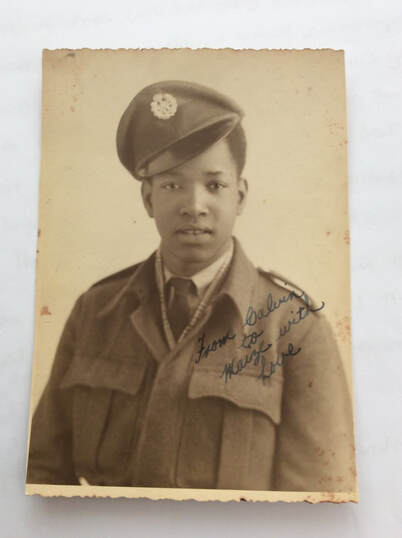Calvin (George) Atherton LeighRemembered by Cheryl Leigh (daughter)
|
Calvin Atherton Leigh, known as George, was born at the Victoria Jubilee Hospital in Kingston, Jamaica in 1930. During the latter war years when recruitment started in the West Indian colonies, he and a friend had been helping others with RAF entry tests. However on 20th September 1944 he volunteered having been encouraged by a cousin who had joined up himself the previous year. At the time of joining, Dad was just fourteen years old and left behind an older sister and grandmother.
There was an ongoing campaign in the country suggesting that ‘the first duty of all loyal subjects was to support the mother country’. He was posted to the United Kingdom on 22nd November 1944 and sailed aboard the SS Cuba. He later disembarked in Greenock, Scotland and went to Filey to complete his initial training. While in the RAF, Dad was part of the Airfield Construction Squad which involved laying matting runways (interlocking wooden surfaces to create a strong runway), repairing plants and machinery and guarding glider parks and surrounding areas. He later worked as a clerk in the orderly room. Dad recalled racist inequalities that worsened with the arrival of white American soldiers due to their culture of segregation back home. Leave had to be arranged on different days to avoid ‘trouble’ in the town. He was discharged on 19th October 1948 in England. He received a bank book containing £27 as a war gratuity and a good service record. After being demobbed he went into engineering and qualified as a high pressure welder working in various employment settings (power stations, electricity board, gas works and constructing the university hospital). George settled in Long Eaton - a town bordering Nottinghamshire and Derbyshire. In 1949 he married Dorothy, a local white girl who he met at the Rialto Ballroom, a venue that offered a place to dance where Black people were welcomed. George and Dorothy went on to have two daughters and their marriage would last for 60 years. They felt comfortable in Long Eaton as many other West Indian ex-service men settled there and a doctor from Guyana had practiced in the town for many years. This provided a support network for each other and for those that followed. This friendship network eventually led to the creation of the Nottingham West Indian Ex-Servicemen's Association in the 1960’s which went on until the Laying up of the Standard in 2008 (when the organisation was disbanded). In 1951 with others he helped set up the first Black organisation in the area, the West Indian Caribbean Cricket Club (CARIBS). The team initially was composed of West Indian ex-servicemen and matches were played with teams from surrounding counties. It also provided a social network for families of the players. Dad’s enthusiasm and commitment to improve race and community relations continued, playing a significant role in the formation of many other organisations. He was chairman of the Commonwealth Citizens Association at the time of the 1958 Nottingham race riots. He was also a founding member of the Afro Caribbean National Artistic Centre (ACNA) in Nottingham, becoming its full-time manager when it opened in the late 1970s. Throughout Dad’s life he continued to champion many causes and projects in Nottingham and was presented with a Local Hero award in 2005. He never returned to the old country but remained a son of Jamaica until his death in 2010. George's service number was 715239. |
|
RAF WW2 recruits
Discover more stories about the Caribbean RAF personnel who trained at Filey.
|
Servicemembers
Read further stories about servicemembers of African descent in the East Yorkshire area.
|
